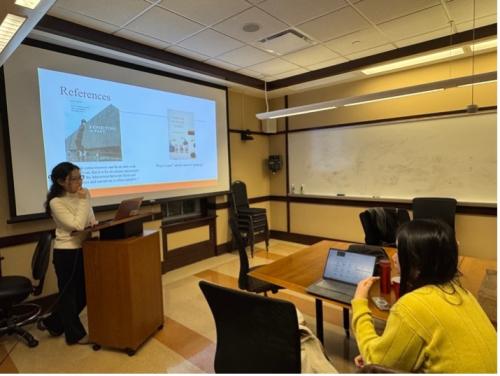
Blog
Academic Speed-Dating: Building a Community of Scholars
The East Asian and Asian Diaspora Studies (EADS) research cluster, a multidisciplinary working group of graduate students, recently conducted an “academic speed-dating” event to allow participants to share their research and network while showcasing the scope and depth of Asia-focused studies happening at Duke.
EADS was developed by graduate students to foster a graduate student community representing multiple disciplines whose work advances East Asia and Asian diaspora studies. The group advances this objective through academic workshops and social gatherings as well as debriefs.
EADS has undertaken a variety of activities showcasing established and junior scholars to give graduate students as well as postdoctoral researchers at Duke an opportunity to develop supportive relationships within and beyond their current academic institution. A major goal of EADS is empowering students to ask questions that will help them progress to the next stage of their academic careers.
by The EADS Team
On the eve of Valentine’s Day, members of the East Asian and Asian Diaspora Studies Working Group (EADS) gathered for an “Academic Speed-Dating” workshop and networking event.
Academic speed-dating is a session of short, 3–minute presentations briefly introducing the presenter’s research, allowing members of EADS to find out about each other as scholars in the field. It also allows students working on East Asia and the Asian diaspora to understand the scope of research that is currently happening at Duke.

For this workshop, four students came up to the podium to introduce themselves as researchers. Insightful questions and lively discussion followed. Presenters and attendees stayed well after the presentations ended to ask further questions and connect with each other as researchers. Here are a few highlights:
Literature and media in contemporary East Asia
Yuting Hu (Literature) started off the workshop, introducing herself as a scholar of literature and media of contemporary East Asia. Yuting expressed her enthusiasm in critical theory, psychoanalysis, and all things related to the psyche. The presentation sparked questions around issues of how the psyche is understood differently in East Asian cultures, as well as how the discussion of such issues may be reconciled with critical theory.
Contemporary art and media engaging North Korea
Following the discussion was Heejin Kim (Literature). She introduced a research project that proposed to look at contemporary art and media that engage with North Korea to question how the concept of nation constructs the geopolitical region of Asia. In the following discussion, attendants asked questions about her conceptual framework, or how to deal with the issue of the Cold War.

Summer research in Shanghai
Anqi Zheng (EAS) talked about her upcoming summer research at the Shanghai Museum. Anqi planned to focus on the questions of how the local museum positions itself as a global institution. Her presentation introduced some of the artifacts in the museum and some factors that constitute the museum’s collection, such as the role of benefactors. Anqi’s presentation prompted questions regarding Shanghai’s position as a young city and the politics surrounding the museum.
National security in U.S.–China relations
The last presenter of the day, Ji Ma (Law) presented on the issue of national security in U.S.–China relations. Providing ample examples such as the TikTok lawsuit as well as Luokung or DJI, Ji proposed to further look into how the problem of national security would further affect transnational law. The insight into recent issues led to a lively debate about the specificity of TikTok and how responses to future national security issues might shift.